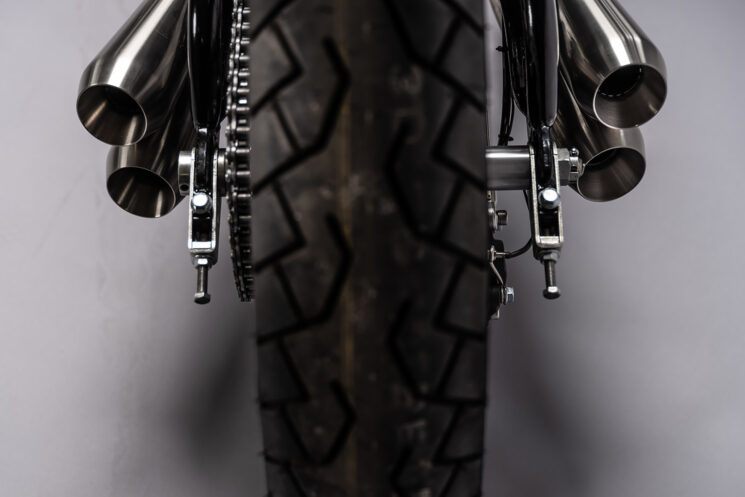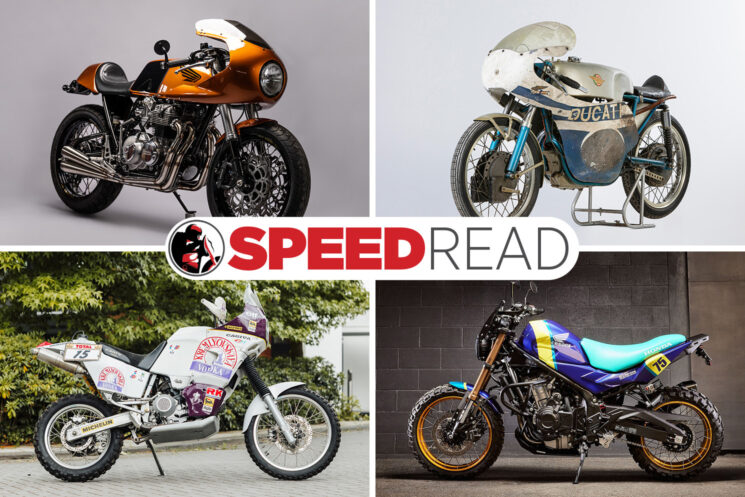
Italy and Japan hold equal shares in this week’s edition of Speed Read. We kick off with a custom Honda CB500X from Ellaspede, and finish off with a Honda CB400 Four from MotoRelic. Wedged between them are an ex-Dakar Cagiva Elefant and an ex-Mike Hailwood Ducati 125 race bike.
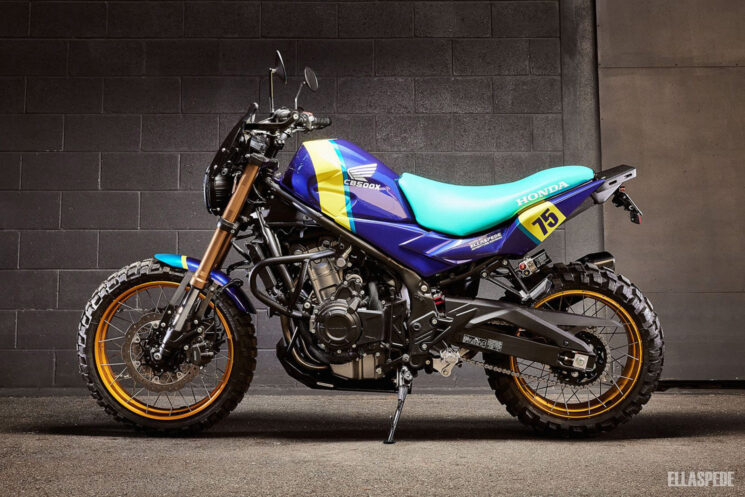
Honda CB500X by Ellaspede Most adventure touring bikes ride fantastically well, but leave a lot to be desired in the looks department. There aren’t a lot of truly pretty adventure bikes, and some of them, like the Honda CB500X, look downright bland.
When Stephen, a friend of the Brisbane-based custom shop Ellaspede, turned up with a very new Honda CB500X, they knew they had their work cut out for them. Stephen already had a café racer project on the go with Ellaspede, and had bought the CB500X to explore local trails.
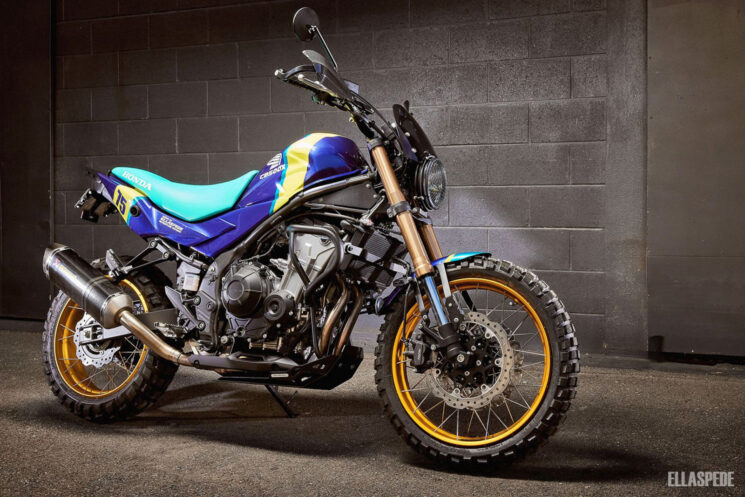
“Even before I started riding bikes I had been a keen follower of the custom bike scene all over the world, especially café racers and scramblers,” says Stephen. “Having a local workshop that produces world-class work right here in Brisbane is fantastic, and having met the guys I knew we would work well together on what are very personal projects.”
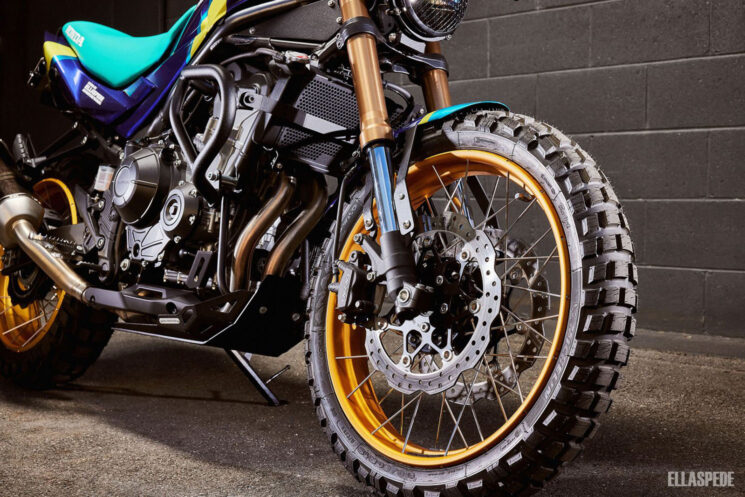
Stephen wanted to improve the Honda’s dirt capability, so the factory-cast wheels had to go. They’re great on tarmac, but when the going gets rough, nothing beats a set of lightweight edge-spoked hoops.
A kit from VMX took care of this, with the front measuring 19×2.5” and the rear 17×4.25”. A set of Michelin Anakee Wild tires was spooned onto the new gold rims (everyone knows that gold wheels add a minimum of 5 hp).
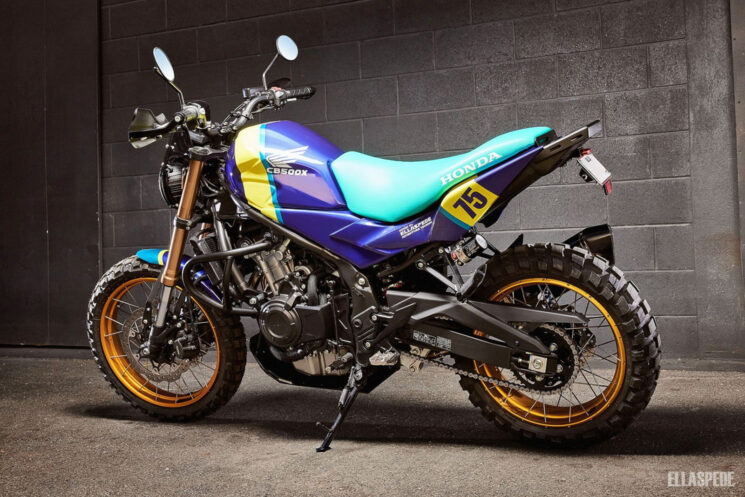
The suspension was also upgraded with help from MPE Suspension, just up the road on the Sunshine Coast. The front forks were rebuilt with custom springs and valves to suit Stephen’s weight and riding style, and the rear shock was upgraded with a YSS unit with a remote reservoir. The new shock boosts the rear by 30 mm as well.
The biggest visual change (other than the wild paint job) is certainly the front end. Stripped of the stock fairings, it has been shrunk down to a minimum. A new 7” headlight from Stedi is held in place by an Ellaspede headlight bracket kit.
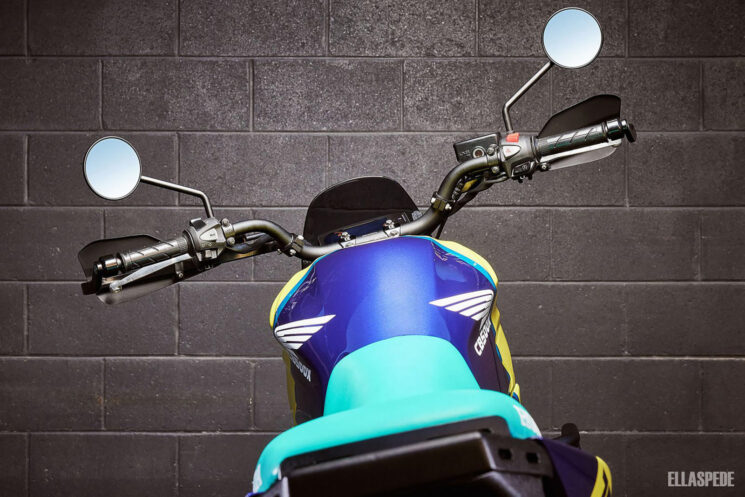
The OEM digital dash is still in play, but it now sits behind a Dart Classic fly screen. The stock risers and bars were ditched in favor of lower risers from Ballards and taller ProTaper Evo Adventure bars. Carbon fibre hand guards from Barkbusters round out the enduro look, but keep it bougie as heck.
The rear side covers were replaced with trimmed and massaged units from a CB125F, and the seat was beefed up and covered in stunning teal motorcycle vinyl. Adorned with white Honda logos, it gives off a serious 80s vibe.
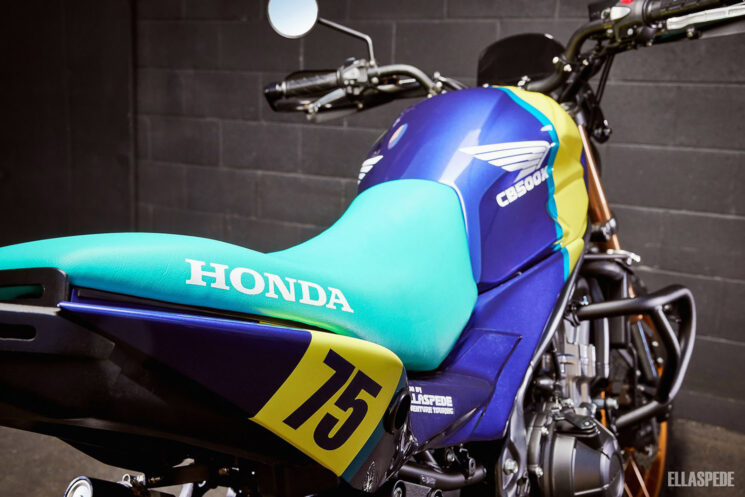
There are a slew of other details on this custom Honda CB500X, each one chosen with a purpose in mind. Standout parts include the gnarly Akrapovič can, and a beefy steel sump guard that replaces the plastic factory item.
Stephen was so enamored with his new-look CB500X, that he shook it down the day after he picked it up with a casual six-hour ride. That’s the sign of a job well done. [More]
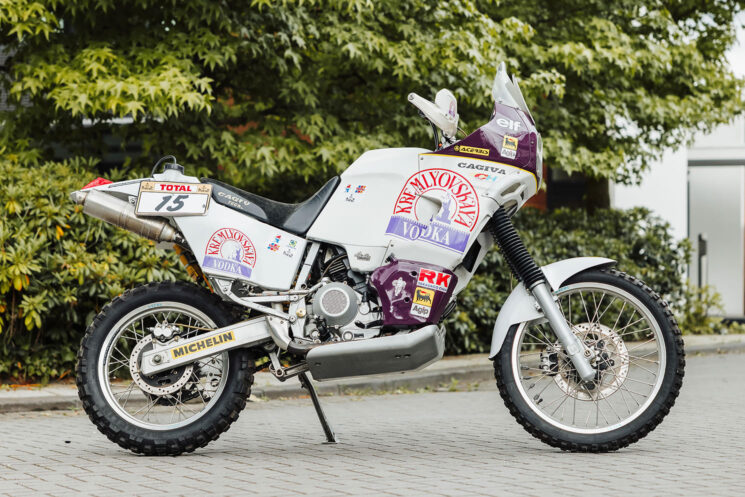
For sale: 1996 Cagiva Elefant Dakar It’s become fashionable for adventure bike manufacturers to field their big twin-cylinder bikes in gnarly off-road races, in a bid to sell more motorcycles. But back in the 80s and 90s, big twin-cylinder bikes dominated races like the Dakar Rally.
The Cagiva Elefant was one such bike. It had tall suspension, a 21F/18R wheelset, front and rear fuel tanks, a tall fairing, and a Ducati 900 SS engine, and it took top spot in the Dakar in both 1990 and 1994.
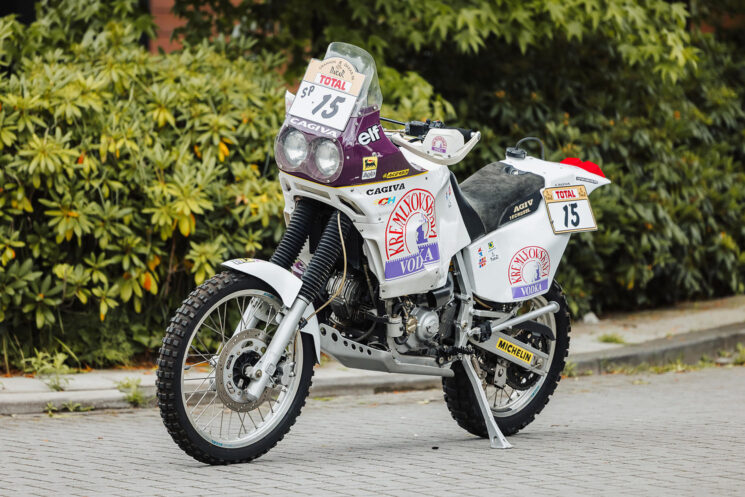
How did a Ducati engine end up in a Cagiva? If you’re not au fait with Cagiva’s history, the Italian company owned Ducati from 1985 up until the late 90s. Parts and technology were shared throughout the company—hence the 900 SS engine ending up inside the bespoke steel and aluminum chassis of the Elefant.
This particular Cagiva Elefant is a bonafide ex-Dakar race bike. It was fielded in the 1996 Dakar Rally by Cyril Esquirol—a French off-road legend who holds the record for the most wins in the now-defunct Gilles Lalay Classic. Unfortunately he didn’t fare as well in the Dakar, with a head injury sustained in a crash forcing him out of the rally early.
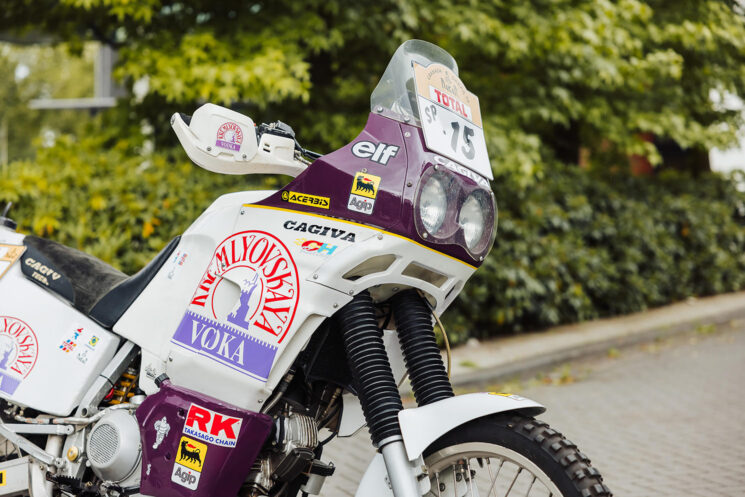
After the bike was returned home, it was repaired, restored, and put on static display, which is probably why it looks so damn perfect. It wears 45 mm Marzocchi forks and a remote-reservoir Öhlins shock , with 290 mm of travel at both ends. The square-section swingarm is nice and beefy, as are the tires and aluminum skid plate.
Tipping the scales at 180 kilos [397 lbs], it’s a lot lighter than it looks. That’s probably thanks to the bodywork being custom-made from carbon fiber and aluminum.
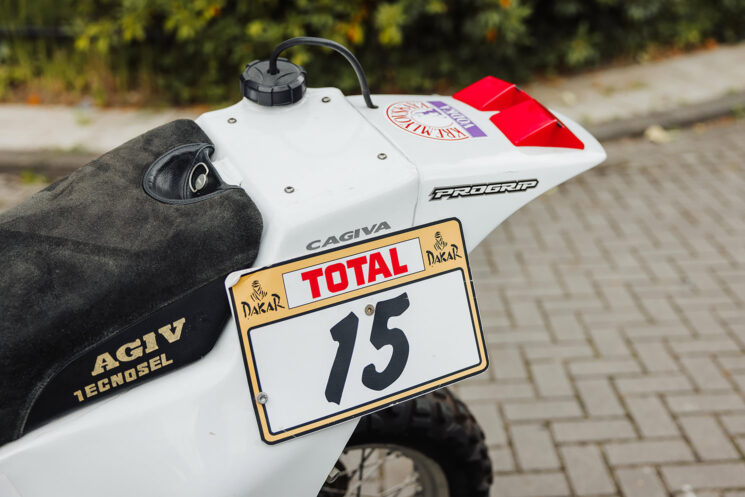
The Elefant is currently being offered for sale by Bonhams, with the price guide starting at around $7,500. And if you miss out on buying it for yourself, we reckon the Ducati DesertX—which took more than a few design cues from the Cagiva Elefant—would look stunning in this livery. [Source]
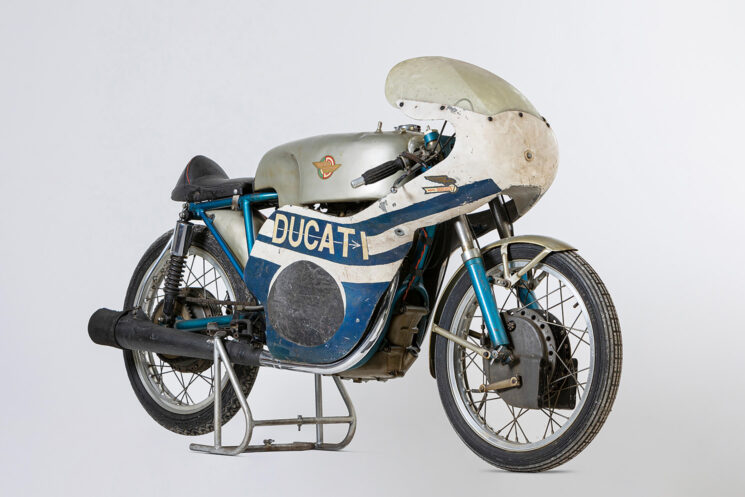
Sold: 1960 ex-works Mike Hailwood Ducati 125 Barcone When Ducati pulled out of Grand Prix racing in 1959, an enterprising man by the name of Stan Hailwood got his hands on a new Ducati ‘Barcone’ 125 Desmo single. The ‘Barcone’ (translates to ‘barge’ in English) nickname came from the nautical aesthetic of the crankcase. Numbered D1 (the first of three or four bikes built for Hailwood’s Écurie Sportive team), the 125 cc Desmodromic single-cylinder engine had a six-speed gearbox and produced nearly 22 horsepower. Oh, and it redlined at 12,500 rpm!
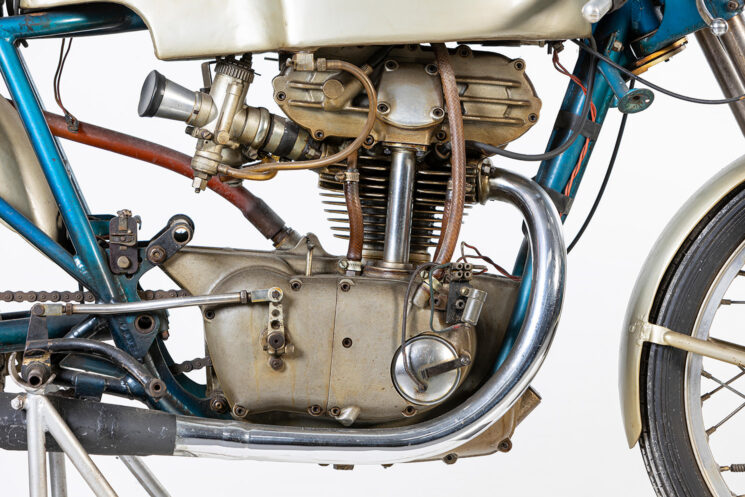
If the name Stan Hailwood sounds familiar, it’s because he was the father of Mike Hailwood, one of the most legendary motorcycle racers of all time. Stan set up the Écurie Sportive team, which is how Mike got onto a Ducati.
Mechanics needed special training from Ducati to work on the bikes, and this included special tools. There were also some modifications that Hailwood requested, including a thicker seat and a taller fuel tank. Mike piloted this bike to victory in nine races and even took it to the Isle of Man TT, where he crashed out on the first lap.
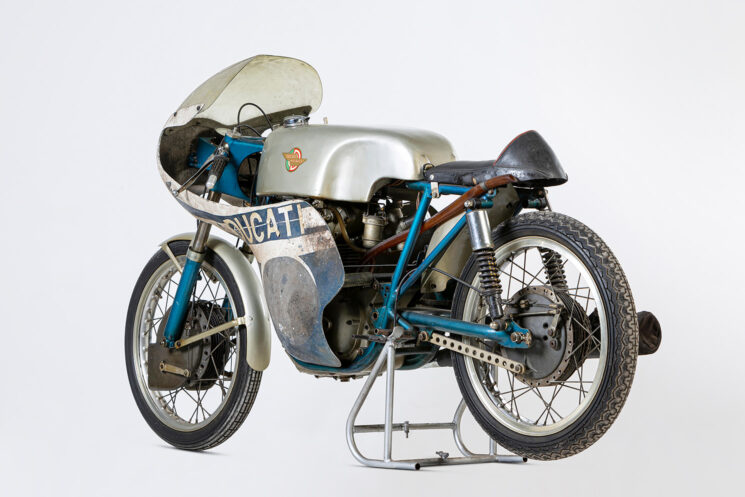
The TT slide led to another few modifications; a new set of forks and fork braces, and a fiberglass fairing to replace the aluminum one. Mike went on to win the 1960 British 125 cc Championship, with Stan selling the D1 Ducati the year after. The bike then continued to race in Britain and Ireland until 1964, when it was retired and swapped hands with collectors over the years.
A gentleman called Captain Ivan Forshaw bought the D1, along with a few other bikes, in the early 1980s. He passed away in 2006 at the age of 95, and the D1 stayed in his family collection until April of this year, when it was auctioned of for close to $169,000. [Source]
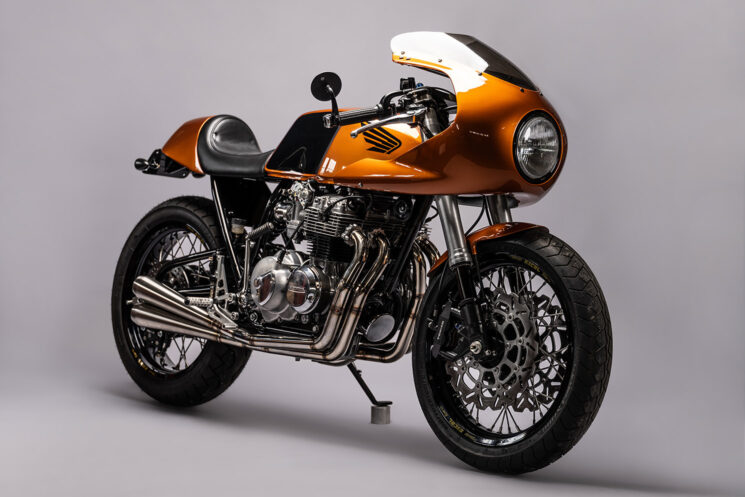
Honda CB400 Four by MotoRelic A while back, Sean Skinner from MotoRelic got a call from a guy in Baltimore named Roger. Roger had a 1975 Honda CB400 Four that he wanted to breathe new life into, having owned it since the 80s. The guys had a long talk, and the the CB soon showed up at Sean’s workshop.
“Once I saw the bike I knew it had great bones and was in pretty decent shape,” says Sean. “I could almost hear the tears of the purists hitting the ground as I thought about how I was going to cut it up. But, that’s what I do.”
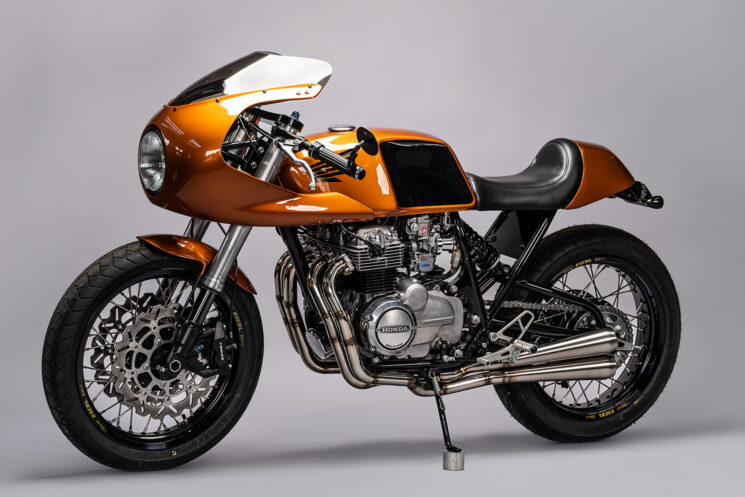
It’s also what Roger wanted. You see, Roger had had a 466 cc big bore conversion, a race cam upgrade, and some light porting done on the Honda, 40 years ago. While we’re sure it looked great as an unrestored survivor, it was time to make it look incredible.
As soon as the bike arrived, Sean called his friends at Cognito Moto and ordered a slew of parts. This included a set of custom 18” spoked wheels, which together with a Suzuki GSX-R front end and a CB550 swingarm took care of the rolling chassis… almost.
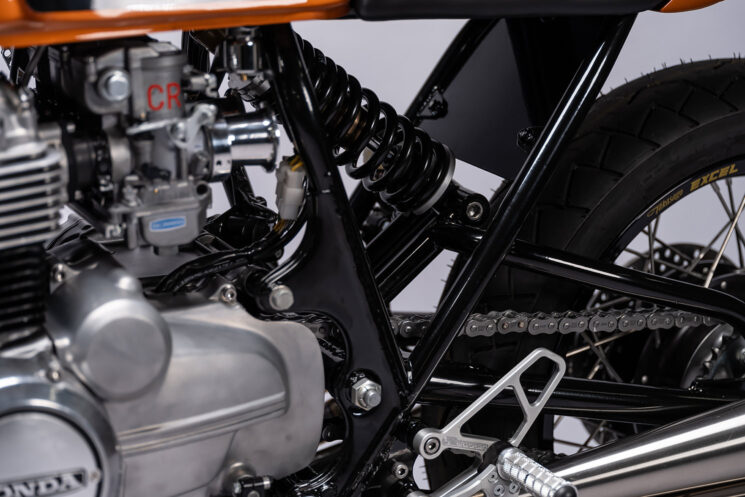
Roger wanted the twin-shock rear end converted to a mono-shock setup, and it needed to fit a 140-section tire. So there’s not much of the original CB550 swingarm left anymore, with Sean completing the design with 1” tubing and an Ikon shock. A Cognito disc brake conversion kit and custom sprocket spacers round out the package.
A Thruxton fairing from Airtech Streamlining made its way onto the bike, with Sean spending hours getting the mounts and brackets just right. The fuel tank is reminiscent of the Honda GB500, but it’s actually a Suzuki GS450 unit. The front fender and mirrors are from Messner Moto, and the bike is controlled by a full suite of Motogadget goodies.
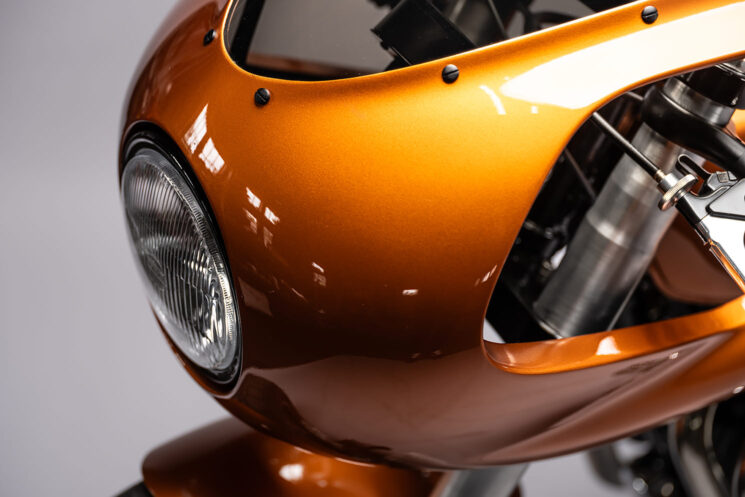
The back end of the CB400 frame was cut back and looped, with a neat kick to give the wheel a bit more room to move. The tailpiece was made from the back half of a Honda NS50 fuel tank, paired with a custom steel seat pan. Counterbalance Cycles handled the black leather upholstery.
Sean tore the engine apart to make sure everything was still within spec, but to his surprise everything still looked brand new. After a new paint job, the engine was back and ready for more action. Helping it breathe a bit easier is a set of CR26 carburetors and a sinuous four-into-four exhaust, made with parts supplied by Cone Engineering. Designed to mimic the classic Honda CB400 header shape, the finished result is a cross between a CB400 and a CB750.
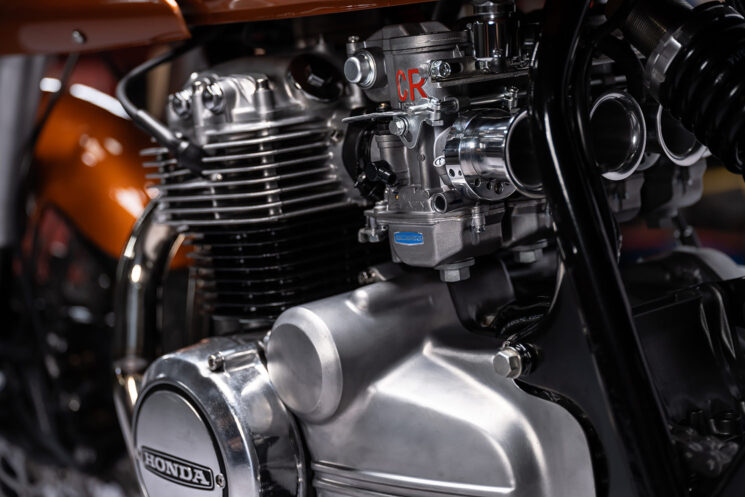
“It’s an incredible bike to ride,” beams a very proud Sean. “From the modern suspension and brakes to the power delivery of that not-so-little 466 cc engine. Hearing those pipes and those carbs on hard acceleration was music to my ears. I wish I could keep it.” [MotoRelic | Images by Jonathan Thorpe]
